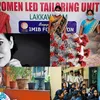Now, a fabric helmet for coronavirus protection in crowded settings
UPES researchers, who developed the fabric helmet, say the primary beneficiaries will be students in schools and colleges where maintaining social distancing can be difficult.
A team of researchers from University of Petroleum and Energy Studies (UPES) in Dehradun, Uttarakhand, has developed a COVID (Comfortably Vented Indigenously Designed) fabric helmet, which is meant for those who are part of crowded settings after the pandemic recedes.
The fabric helmet provides protection to individuals and reduces their dependence on additional PPEs. The primary target beneficiaries will be students in schools and colleges where maintaining social distancing and ensuring strict compliance to the wearing of masks can be difficult.
The team which developed the helmet was led by Dr Ashish Karn from the MultiPhase Flows Laboratory, Department of Mechanical Engineering, UPES.
“Truly, I owe the inspiration behind the development of this product to my teacher, who always inspired me to use my intelligence for the benefit of the nation and mankind,” Dr Ashish Karn told SocialStory.
The other members of the team are Dr Abhay Kumar, doctoral scholar Gaurav Mittal, and a senior undergraduate student, Shashank Singh Deo. They are not only performing design iterations, but are also aiming at pilot studies to collect statistical data and gauge the comfort level of the users.

Model of the COVID Fabric Helmet
The product has been commercialised in two price segments. One with N95 mask embedded in it which will cost around Rs 200 and the cheaper one will cost less than Rs 100.
The National Innovation Foundation has shown particular interest in funding this product. Even plans for collaboration with fashion designers and tech experts are underway, so as to ensure that the product reaches the masses.
Currently, they are working with their industry partner Rainbow Uniforms, Haridwar, on developing several possible designs of the COVID fabric helmets for deployment and pilot study.
The pilot study will be aimed at generating awareness among school and college authorities regarding the need for such a product, so as to ensure student safety and well-being.
“Of all the studies and research work I have done, I always thought about what I have given back to society. Working on this project brought me closer to the feeling of achievement for doing my duty as a human being for the people around me,” said Shashank Singh Deo.
Do you have an interesting story to share? Please write to us at [email protected]. To stay updated with more positive news, please connect with us on Facebook and Twitter.
Edited by Javed Gaihlot







